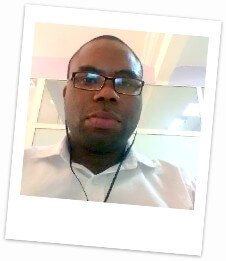 PMP® exam stress can be hard to manage. In this post Edet Archibong shares 3 tips to avoid exam stress & a new exam perspective you might not have thought of!
PMP® exam stress can be hard to manage. In this post Edet Archibong shares 3 tips to avoid exam stress & a new exam perspective you might not have thought of!
Edet has over 6 years of experience working for Huawei Technologies Cote D’Ivoire (Ivory Coast) as a Quality Manager, Site Manager and Implementation Manager. His works takes him across several West African Countries. While he loves traveling, Edet has a goal of constantly learning to enhance his knowledge.
Let’s have a read..
How did you decide of taking up PMP®?
 I have been working on various projects for 6+ years, and in each project I get to work on a different aspect of project management. I always wondered about the areas of project management that I am missing.
I have been working on various projects for 6+ years, and in each project I get to work on a different aspect of project management. I always wondered about the areas of project management that I am missing.
It became clear to me that I needed a comprehensive and all-round understanding of project management – which was possible by taking up a certification exam.
While I researched and found various options, Project Management Professional (PMP®) was one option that covered all aspects of project management.
Right from pre-initiation (business case, needs assessment etc) to all the way closing the right way. Right from collecting user requirements to managing procurement – PMP® covers it all.
My core goal has been to be able to manage any project end to end on my own.
I figured PMP® would be the one that helps me get there.
Now that you have PMP® certification, how do you think it will help you?
I believe that knowledge and action both will get us grow in our career. I have got knowledge part from my PMP® prep experience.
It would help me take more informed decisions on my projects, which would make me confident about my actions. Also, I believe PMP® helps me become a better leader.
Also Read: PMP Brain dump strategy is NOT dead. Click to know all about it (and get my brain dump for free).
Tell us about the study resources you used for your exam.
I did an online training with Invensis Learning Systems.
Apart from this, I used the PMBOK guide – which I found is a good reference book.
I also used Rita Mulcahy’s book, and Joseph Phillips book.
What was your study approach?
I approached my exam preparation with the perspective that ‘I was already a PMP all I needed was for the exam to confirm it’.
I firmly believe that this mindset played a major role in my exam success.
Wow, that’s powerful. Any blockers you faced?
Of course. Mostly in terms of complexity of concepts.
I had issues with Contract types under the Procurement Knowledge area, and many concepts in Risk Management.
To address these I had to re-read those knowledge areas over and over again. I did this till I had a good understanding of the concepts. I reinforced this understanding by attempting as many mock test questions as possible.
Especially in the week prior to the exam I attempted as many practice questions as usual, from Oliver Lehman and of course Rita, while aiming for a pass mark of 85%.
Also read: My recommended top PMP study resources (including bunch of free access)
How about the exam?
Phew! I was nervous throughout.
Thankfully things went more or less according to the plan, I was elated to see the ‘Congratulations’ message on the screen! 🙂
Any study tips for PMP aspirants?
I think these 3 points are useful to manage the PMP® exam stress and increase the odds of success.
- First would be to study at your pace. Most of us manage multiple hats at work and need to balance personal commitments as well.
Moreover, PMP exam is not something one could do in a week’s time of additional effort. It takes consistent effort over many weeks or months. And it takes making changes to one’s daily routines for a longer period of time.
Rather than forcing yourself and burning out, the approach of making slight changes to carve in study time would be more useful, in my view.
- Second, pick a study plan that works for you.
No matter what you read, and what plans you get – there is no one plan that fits all.
Even if you are given a plan, assess it against your own circumstances and refine to suit your needs.
- Third, do not try to cram the ITTO’s.
Many a people do this mistake. Mindless cramming will only add to the exam stress.
Instead try to understand the logic behind the processes, inputs, tools and techniques, outputs – especially think why are they needed.
This approach helps you logically weave processes and ITTOs in your mind.
Thus when you answer and questions (even non-ITTO based ones), you will be able to logically deduce answers.
There you have it. I hope you’ll make use of these insights and avoid PMP® exam stress.
All the best,



